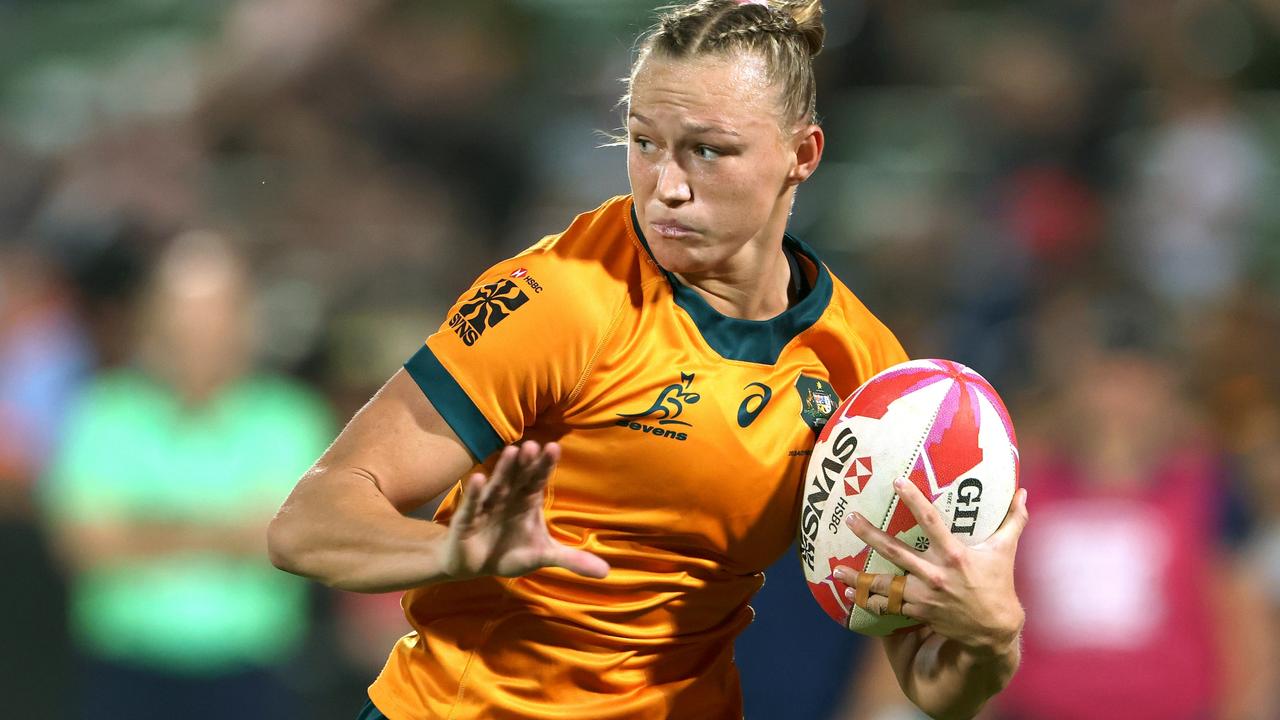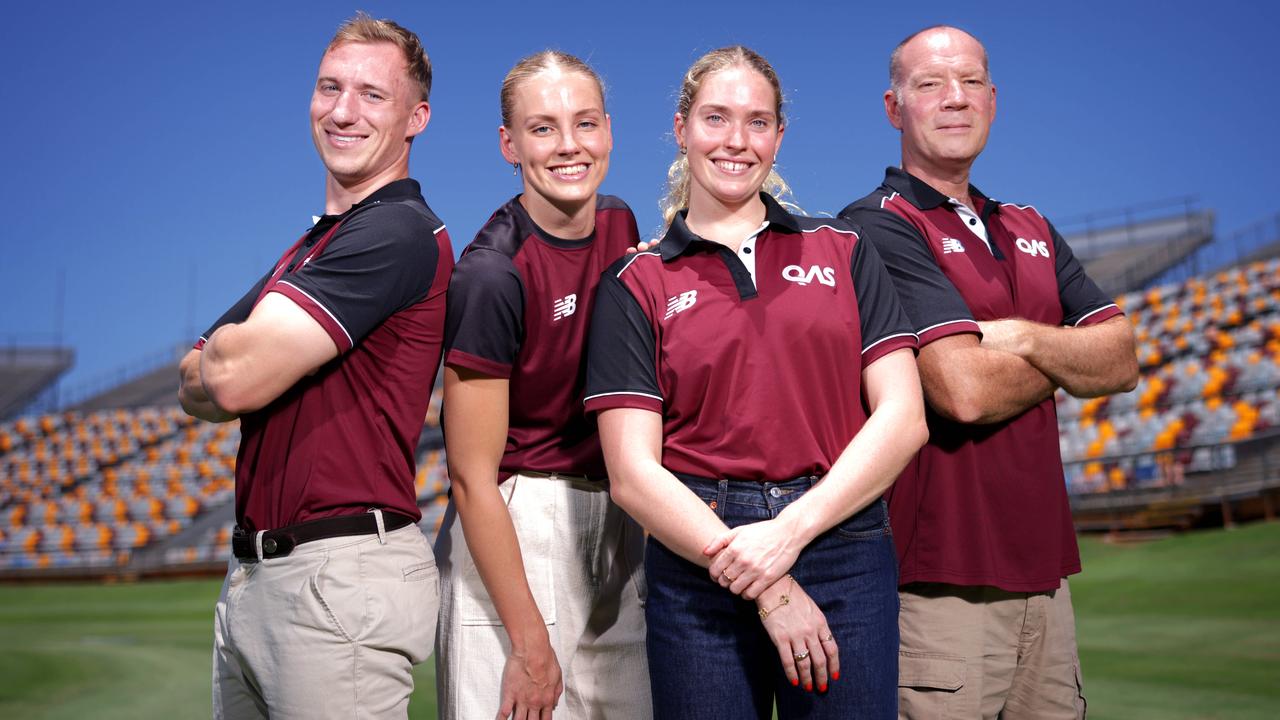Australian women’s sevens team suffer defeat in bronze medal playoff at Paris Olympics
Australia’s womens’ sevens team were in control in both their semi final and then bronze medal playoff games, when things fell apart.

Rugby Sevens
Don't miss out on the headlines from Rugby Sevens. Followed categories will be added to My News.
Australia’s medal hopes in the women’s sevens have been washed away in a sea of mistakes and misery at Stade de France.
The women arrived in Paris among the favourites to win a gold medal.
All they will take home is broken hearts and shattered dreams.
Worst of all, they only had themselves to blame after they managed to throw away not one, but two games on the final day of the sevens competition.
Against Canada in the semifinal, they were running amok until they let their guard down, conceded a runaway try on the stroke of halftime and capitulated in the second half.
Against the United States, they were in control until the final seconds but again relaxed and were made to pay.
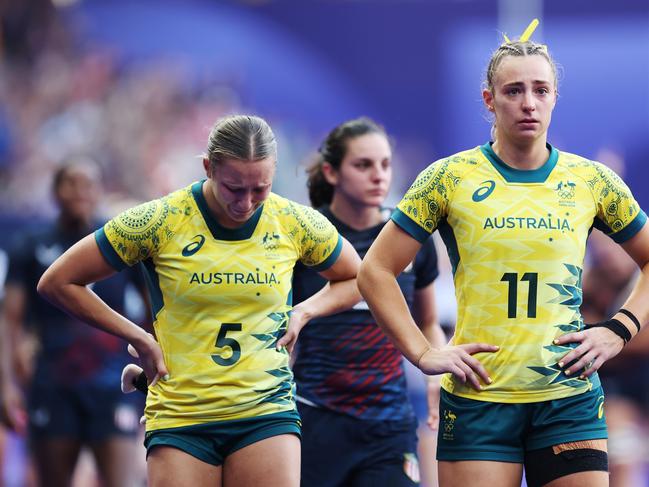
Coach Tim Walsh afterwards insisted their tournament wasn’t a failure, opting to sum up their performance by borrowing a line from Rudyard Kipling’s famous poem “If”.
“Triumph and disaster, they are both imposters and you have to treat them the same way,” Walsh said.
Less poetry and more ball control would have been handy on Wednesday morning (AEST). This was anything but a triumph. It certainly seemed more akin to a disaster given the high expectations that accompanied the team on their trip to Paris.
Asked whether it was cruel to look at the result that way, Walsh said: “I think it’s very cruel. We were against really good opposition, we played some good footy and there were just moments there that we didn’t execute, and (if) we could have and should have held our nerve, it would have been a different result.
“But we didn’t.”
Walsh got it right there. Big games in big tournaments require nerves of steel and when the pressure was on, Australia wasn’t able to take control.
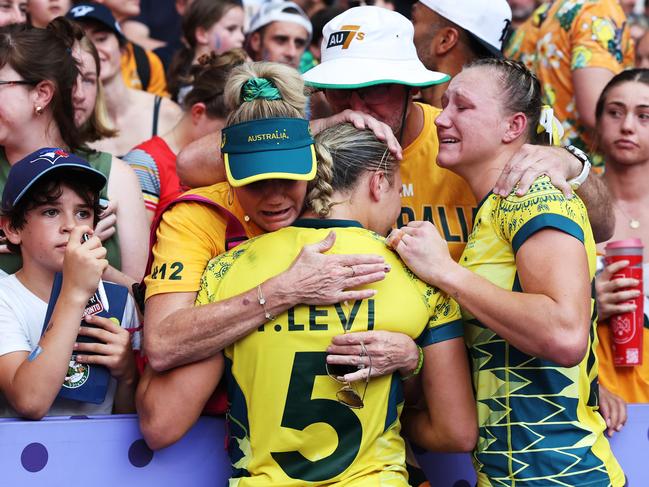
They lost their grip and their medal hopes went with it in a North American horror show as the dark shadows that lingered after their Tokyo disaster appeared again.
“It sucks,” captain Charlotte Caslick said as she choked back tears.
“Obviously we more than anyone want to come home with a medal. We’re the ones that train every day, that have this feeling. We’re disappointed.”
Ironically, their mantra for the tournament was no regrets. Regret may be the only thing they do take home from Paris, where salt was rubbed into their gaping wounds as bitter rivals New Zealand went on to win the gold medal game.
“They are devastated,” Walsh said.
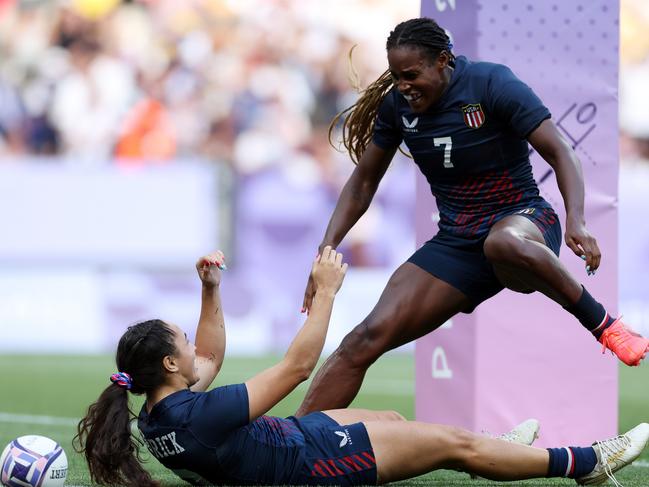
“They put a lot into it…. but we are going to hold our heads high. We came to this tournament to walk away without regret in terms if our preparation.
“Every single one of them have done that, they can be proud.”
That’s not to say it was a complete disaster. There were some highlights, most notably the record-breaking performance of Maddison Levi and the emergence of her sister Teagan as a genuine sevens star.
Change though is on the way. Sharni Smale and Dominique du Toit are set to walk away and Walsh may join them, declining to say whether he wanted to coach on.
The writing may be on the wall. This was meant to be Australia’s Games. It ended up anything but.
American Horror Story
The beauty - or tragedy - of the Olympics is that four years can come down to one moment. One split second. One lapse in judgement or drop in concentration.
For the Australian women’s sevens team, it came on the stroke of halftime in their semifinal against Canada. Everything was going swimmingly until Charity Williams switched on and the Aussies switched off.
They had cruised to the front through tries to Maddison Levi - who else? - and Sariah Paki. A 12-0 lead had arrived in the blink of an eye, which was ideal given the stifling conditions that greeted the players as they ran onto Stade de France.
If you could win easy, this was the day to do it. Tick this game off, conserve your energy and get ready for a gold medal match against New Zealand.
Then the moment that will come to define this tournament and leave a lasting scar on the women who arrived in Paris with legitimate hopes of winning a gold medal.
The Australians were camped on the Canadian line when they conceded a penalty. They needed to be alert but dropped their guard and Williams landed what ended up being a killer blow, racing the length of the field to pull Canada back into the contest.
The gap was yawning. Charlotte Caslick was caught on the ground and Bienne Terita dozed off. Williams didn’t need a second invitation. This 54-year-old aching body could have found the hole that was staring her in the face.
Levi chased hard but there was no catching the Canadian.
“I think we cost ourselves a bit,” Caslick said.
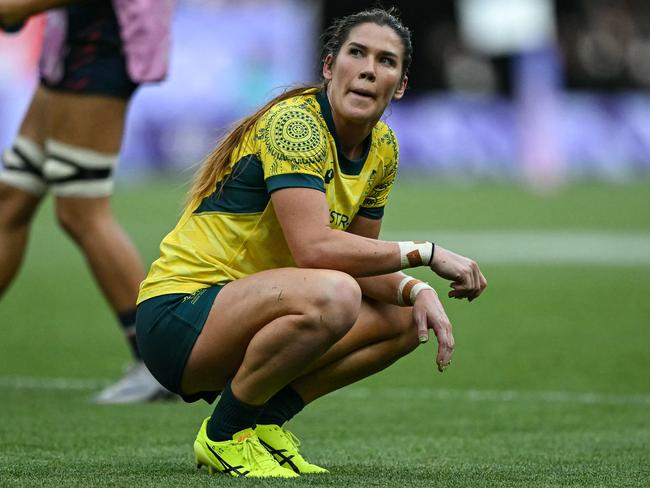
You think? That may have been the understatement of the tournament. When the second half arrived, Canada had the wind in their sails.
It was all they needed. Australia were on the back foot and didn’t have the resilience or fortitude to pull themselves out of the hole they had dug for themselves.
“We were not 100 percent in the back end of the first half,” Caslick continued.
“And then they got back into the game. And in the second half we did not have any ball, and couldn’t get it away from them.
“We can’t fault the effort. It was there, but perhaps we were just too eager at times.”
After the disaster of Tokyo, when the team finished fifth after stumbling in the group phase against the United States and then losing in the quarter-final to Fiji, this was meant to be their time.
In Maddison Levi, they had arguably the biggest star of the seven series. Her sister Teagan was no slouch either. Maddison had contemplated switching codes after Tokyo but Teagan convinced her to stay with the sevens program - she wanted them to win gold together.
The silver lining is that maybe this disappointment may prompt them to stick at it for another four years. Rival codes will certainly come knocking - it is understood their camp asked for permission to look at the NRLW next year but Rugby Australia knocked them back - and it seems only a matter of time before they make the move.
The lure of a gold medal may ensure the NRLW and AFLW are forced to wait another four years. Other players may not have that luxury. The likes of Dominique du Toit and Sharon Smales have already announced they will leave the sevens system after the Olympics.
Caslick is 29 and time will tell whether she is on board for Los Angeles. She had bemoaned the lack of recognition for the side on the eve of the tournament - she had suggested they deserved as much fanfare if not more than the Matildas - and arrived with a point to prove.
For a long time, it looked like they would prove it. Then Canada, fresh from a giant-killing win over France in the quarterfinals, arrived and all hell broke loose.
“It is what it is,” Caslick said.
“The girls tried their hearts out. You can’t ask for any more than that.”
That may be true. But a gold medal would have been nice.
More Coverage
Originally published as Australian women’s sevens team suffer defeat in bronze medal playoff at Paris Olympics





